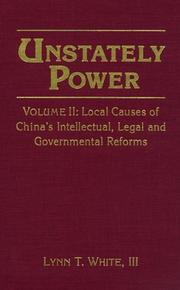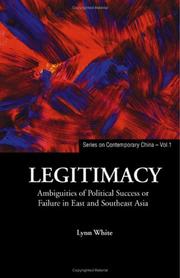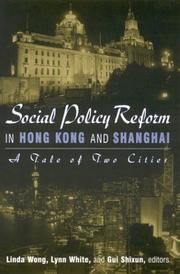| Listing 1 - 10 of 13 | << page >> |
Sort by
|
Book
ISBN: 0520033612 Year: 1978 Publisher: Berkeley University of California press
Abstract | Keywords | Export | Availability | Bookmark
 Loading...
Loading...Choose an application
- Reference Manager
- EndNote
- RefWorks (Direct export to RefWorks)
S11/0470 --- S11/0494 --- S11/0505 --- S11/0830 --- Manpower policy --- -Occupational mobility --- -Occupations --- -#SML: Joseph Spae --- Career patterns --- Careers --- Jobs --- Trades --- Handicraft --- Vocational guidance --- Work --- Job mobility --- Mobility, Occupational --- Social mobility --- Employment policy --- Human resource development --- Labor market --- Labor market policy --- Manpower utilization --- Labor policy --- Labor supply --- Trade adjustment assistance --- China: Social sciences--Cities: since 1949 --- China: Social sciences--Society since 1949 --- China: Social sciences--Daily life: 1949 - 1966 --- China: Social sciences--Labour conditions and trade unions: since 1949 --- Government policy --- Occupational mobility --- Occupations --- #SML: Joseph Spae

ISBN: 0765601486 Year: 1998 Publisher: Armonk Sharpe
Abstract | Keywords | Export | Availability | Bookmark
 Loading...
Loading...Choose an application
- Reference Manager
- EndNote
- RefWorks (Direct export to RefWorks)
S06/0224 --- S06/0225 --- S06/0255 --- S06/0424 --- S08/0300 --- China: Politics and government--People's Republic: central government: since 1976 --- China: Politics and government--People's Republic: local and provincial government: since 1976 --- China: Politics and government--Political theory: modern (and/or under Western influence) --- China: Politics and government--CCP: since 1989 --- China: Law and legislation--General works and codices: general and before 1949 --- Entrepreneurship --- Law reform --- Local government --- Political planning --- Politics and culture --- Power (Social sciences)
Book
ISBN: 0691609160 0691008760 1400860571 0691055467 Year: 1989 Publisher: Princeton (N.J.): Princeton university press
Abstract | Keywords | Export | Availability | Bookmark
 Loading...
Loading...Choose an application
- Reference Manager
- EndNote
- RefWorks (Direct export to RefWorks)
The tumult of the Cultural Revolution after 1966 is often blamed on a few leaders in Beijing, or on long-term egalitarian ideals, or on communist or Chinese political cultures. Lynn White shows, however, that the chaos resulted mainly from reactions by masses of individuals and small groups to three specific policies of administrative manipulation: labeling groups, designating bosses, and legitimating violence in political campaigns. These habits of local organization were common after 1949 and gave the state success in short-term revolutionary aims, despite scarce resources and staff--but they also drove millions to attack each other later.First, measures accumulated before 1966 to give people bad or good names (such as "rightist" or "worker"); these set a family's access to employment, education, residence, and rations--so they gave interests to potential conflict groups. Second, policies for bossism went far beyond Confucian patronage patterns, making work units tightly dependent on Party monitors--so rational individuals either pandered to local bosses or (when they could) deposed them. Third, the institutionalized violence of political campaigns both mobilized activists and scared others into compliance. These organizational measures were often effective in the short run before 1966 but accumulated social costs that China paid later. The book ends with comparisons to past cases of mass urban ostracism in other countries, and it suggests how such tragedies may be forecast or prevented in the future.Originally published in 1989.The Princeton Legacy Library uses the latest print-on-demand technology to again make available previously out-of-print books from the distinguished backlist of Princeton University Press. These editions preserve the original texts of these important books while presenting them in durable paperback and hardcover editions. The goal of the Princeton Legacy Library is to vastly increase access to the rich scholarly heritage found in the thousands of books published by Princeton University Press since its founding in 1905.
S06/1050 --- S06/0421 --- S06/0425 --- S06/1040 --- China: Politics and government--The First Years of the Cultural Revolution (1966-69) --- China: Politics and government--CCP: 1949 - 1966 --- China: Politics and government--Organization and structure of the CCP --- China: Politics and government--Socialist Education Movement (1962-65) --- S04/0921 --- S11/0900 --- S06/0422 --- S02/0200 --- China: History--PRC: 1966 - 1976 --- China: Social sciences--Social pathology, social deviance (incl. infanticide, abandoned children, hoodlums) --- China: Politics and government--CCP: 1966 - 1976 --- China: General works--Civilization and culture --- China --- Cina --- Kinë --- Cathay --- Chinese National Government --- Chung-kuo kuo min cheng fu --- Republic of China (1912-1949) --- Kuo min cheng fu (China : 1912-1949) --- Chung-hua min kuo (1912-1949) --- Kina (China) --- National Government (1912-1949) --- China (Republic : 1912-1949) --- People's Republic of China --- Chinese People's Republic --- Chung-hua jen min kung ho kuo --- Central People's Government of Communist China --- Chung yang jen min cheng fu --- Chung-hua chung yang jen min kung ho kuo --- Central Government of the People's Republic of China --- Zhonghua Renmin Gongheguo --- Zhong hua ren min gong he guo --- Kitaĭskai︠a︡ Narodnai︠a︡ Respublika --- Činská lidová republika --- RRT --- Republik Rakjat Tiongkok --- KNR --- Kytaĭsʹka Narodna Respublika --- Jumhūriyat al-Ṣīn al-Shaʻbīyah --- RRC --- Kitaĭ --- Kínai Népköztársaság --- Chūka Jinmin Kyōwakoku --- Erets Sin --- Sin --- Sāthāranarat Prachāchon Čhīn --- P.R. China --- PR China --- Chung-kuo --- Zhongguo --- Zhonghuaminguo (1912-1949) --- Zhong guo --- Chine --- République Populaire de Chine --- República Popular China --- Catay --- VR China --- VRChina --- 中國 --- 中国 --- 中华人民共和国 --- Jhongguó --- Bu̇gu̇de Nayiramdaxu Dundadu Arad Ulus --- Bu̇gu̇de Nayiramdaqu Dumdadu Arad Ulus --- Bu̇gd Naĭramdakh Dundad Ard Uls --- Khi︠a︡tad --- Kitad --- Dumdadu Ulus --- Dumdad Uls --- Думдад Улс --- Kitajska --- Politics and government --- -History --- -Cultural Revolution, 1966-1976. --- History --- Histoire --- Politique et gouvernement --- China -- History -- Cultural Revolution, 1966-1976. --- China -- Politics and government -- 1949-1976.

ISBN: 1281881015 9786611881016 9812569340 9789812569349 9812560920 9789812560926 Year: 2005 Volume: v. 1 Publisher: Singapore New Jersey, NJ World Scientific
Abstract | Keywords | Export | Availability | Bookmark
 Loading...
Loading...Choose an application
- Reference Manager
- EndNote
- RefWorks (Direct export to RefWorks)
This book documents the bases for a new view of legitimacy in general and in various parts of Asia, including China, Malaysia, South Korea, Taiwan and Japan. The authors see legitimacy anywhere as always partial, rather than total, and somewhat measurable.
Legitimacy of governments --- Governments, Legitimacy of --- Legitimacy (Constitutional law) --- Consensus (Social sciences) --- Revolutions --- Sovereignty --- State, The --- General will --- Political stability --- Regime change --- China --- Politics and government --- Southeast Asia --- East Asia
Book
ISBN: 1282443143 9786612443145 9812836837 9789812836830 9781282443143 9789812836816 9812836810 9789812836823 9812836829 Year: 2009 Publisher: Singapore Hackensack, NJ World Scientific
Abstract | Keywords | Export | Availability | Bookmark
 Loading...
Loading...Choose an application
- Reference Manager
- EndNote
- RefWorks (Direct export to RefWorks)
Why have Taiwan, rich parts of China, and Thailand boomed famously, while the Philippines has long remained stagnant both economically and politically? Do booms abet democracy? Does the rise of middle "classes" promise future liberalization? Why has Philippine democracy brought no boom and barely served the Filipino people? This book, unlike most previous studies, shows that both the roots and results of growth are largely political rather than economic. Specifically, it pays attention to local, not just national, power networks that caused or prevented growth in the four places under consider
Power (Social sciences) --- Democracy --- Political corruption --- Boss rule --- Corruption (in politics) --- Graft in politics --- Malversation --- Political scandals --- Politics, Practical --- Corruption --- Misconduct in office --- Empowerment (Social sciences) --- Political power --- Exchange theory (Sociology) --- Political science --- Social sciences --- Sociology --- Consensus (Social sciences) --- Corrupt practices --- Asia --- Politics and government --- Economic conditions
Book
ISBN: 1626375380 9781626375383 9781626375352 1626375356 Year: 2022 Publisher: Boulder
Abstract | Keywords | Export | Availability | Bookmark
 Loading...
Loading...Choose an application
- Reference Manager
- EndNote
- RefWorks (Direct export to RefWorks)
Hong Kong and its relationship with China make for a uniquely intriguing study in democratization. What has hindered or caused greater popular sovereignty in Hong Kong? Over what time period and under what conditions could further democratization occur? Addressing these questions through the lens of comparative democratization theories, Lynn White explores Hong Kong's complicated politics-and how further democratization in Hong Kong could affect China.
Democratization --- Democratic consolidation --- Democratic transition --- Political science --- New democracies --- Hong Kong (China) --- China --- Politics and government --- S27/0602 --- Hong Kong--Politics and government: since 1945

ISBN: 0765600447 Year: 1998 Publisher: Armonk Sharpe
Abstract | Keywords | Export | Availability | Bookmark
 Loading...
Loading...Choose an application
- Reference Manager
- EndNote
- RefWorks (Direct export to RefWorks)
Entrepreneurship --- -Local government --- -Law reform --- -Political planning --- -Politics and culture --- -Power (Social sciences) --- -China --- Economic policy --- -Entrepreneurship --- Economic policy -
Book
ISBN: 9781400860579 Year: 2014 Publisher: Princeton, NJ
Abstract | Keywords | Export | Availability | Bookmark
 Loading...
Loading...Choose an application
- Reference Manager
- EndNote
- RefWorks (Direct export to RefWorks)

ISBN: 1315498014 1315498006 1315497999 9781315497990 9781315498003 0765613115 9780765613110 9780765613110 9781315497983 1315497980 9781315498010 Year: 2015 Publisher: London
Abstract | Keywords | Export | Availability | Bookmark
 Loading...
Loading...Choose an application
- Reference Manager
- EndNote
- RefWorks (Direct export to RefWorks)
Hong Kong (China) --- Shanghai (China) --- Changhaï (China) --- Ṣămhayi (China) --- Shang-hai (China) --- Shang hai shi (China) --- Shanghai --- Shanghai Municipality (China) --- Shanghai Shi (China) --- Shanghai Shi ren min zheng fu (China) --- Shankhaĭ (China) --- Xangai (China) --- 上海 (China) --- Hong Kong Special Administrative Region (China) --- Xiang gang te bie xing zheng qu (China) --- 香港特別行政區 (China) --- Zhonghua Renmin Gongheguo Xianggang Tebie Xingzhengqu --- Chung-hua jen min kung ho kuo Hsiang-kang tʻe pieh hsing cheng chʻü --- Zhong hua ren min gong he guo Xiang gang te bie xing zheng qu --- 中華人民共和國香港特別行政區 --- HKSAR (China) --- Hsiang-kang tʻe pieh hsing cheng chʻü (China) --- Xianggang (China) --- 香港 (China) --- Xianggang Tebie Xingzhengqu (China) --- Hong Kong S.A.R. (China) --- Hong Kong --- Social policy. --- S03/0633 --- S10/0440 --- S11/0550 --- S11/0732 --- S14/0454 --- S20/1040 --- S21/0500 --- S27/0800 --- S27/0815 --- China: Geography, description and travel--Shanghai (incl. concessions) --- China: Economics, industry and commerce--Real estate --- China: Social sciences--Social welfare system --- China: Social sciences--Elderly people --- China: Education--Education: since 1989 --- China: Agriculture forestry, fishery, natural disasters--Famine and famine relief --- China: Medicine, public health and food--Public health, hospitals, medical schools, etc --- Hong Kong--Society in general --- Hong Kong--Society in transition --- SOCIAL SCIENCE --- Ethnic Studies --- General. --- Chang-hai (China) --- Schanghai (China) --- 上海市(China) --- 上海市人民政府 (China) --- Шанхай (China) --- Śangqai (China)
Book
ISBN: 9780415705363 9781315889788 9781134512140 9781134512218 9781138066212 Year: 2014 Publisher: London Routledge
Abstract | Keywords | Export | Availability | Bookmark
 Loading...
Loading...Choose an application
- Reference Manager
- EndNote
- RefWorks (Direct export to RefWorks)
"Rapid economic pluralization in East Asia has empowered local and medial groups, and with this change comes the need to radically rethink usual notions regarding the ways in which 'democracies' emerge or 'citizens' gain more power. This book demonstrates how careful examinations of current developments in East Asia indicate a need for major expansion of our understandings of democracy and democratization, and challenges the traditional way in which political regimes are conceived and labelled. Further, it shows from Asian experiences that democracy and its precursors come in more forms than most liberals have yet imagined. In reviewing the experiences of states across East Asia, this book shows that actual democracies and ostensible democratizations in Asia are less like those in the West than the surprisingly consensual standard political science of democratization suggests. It first examines the extreme variation of democracy's meaning in many Asian states that hold contested elections (South Korea, Taiwan, Indonesia, Malaysia, the Philippines, and Thailand), and in turn shifts its attention to China. It analyses a range of grassroots forces driving political change in the PRC, and uncovers both accelerators and brakes on China's political reform process. Importantly, the contributors show that models for China's political future exist both outside the PRC, including in other East Asian states, and within China, in localities and sectors that already are pushing the boundaries of the powerful, but no longer all-powerful, PRC party-state"--
S06/0223 --- S26/0600 --- S31/0100 --- Democratization --- K9500.80 --- Democratic consolidation --- Democratic transition --- Political science --- New democracies --- China: Politics and government--People's Republic: general: since 1976 --- Taiwan--Politics and government: since 1945 --- Indo China and South East Asia--Indo-China: general (Vietnam, Laos, Cambodia, Thailand, Burma) --- Korea: Politics -- history -- modern period, postwar period (1945- ) --- China --- Korea (South) --- Southeast Asia --- Asia, Southeast --- Asia, Southeastern --- South East Asia --- Southeastern Asia --- Politics and government --- USAMGIK --- United States Army Military Government in Korea --- Taehan Minʼguk --- Han guo --- Dae Han Min Kuk --- Tae Han Min Guk --- Daehan-Minʼguk --- South Korea --- Tai Han Min Kook --- South Korean Interim Government --- S.K.I.G. --- SKIG --- Nam Chosŏn Kwado Chŏngbu --- Namjosŏn --- Namjosŏn Kwado Chŏngbu --- Republic of Korea --- Da Han Minguo --- Daehan Min-kuk --- Daikan Minkoku --- ROK --- 대한민국 --- 大韓民國 --- 대한 민국 --- Daehanminguk --- Cina --- Kinë --- Cathay --- Chinese National Government --- Chung-kuo kuo min cheng fu --- Republic of China (1912-1949) --- Kuo min cheng fu (China : 1912-1949) --- Chung-hua min kuo (1912-1949) --- Kina (China) --- National Government (1912-1949) --- China (Republic : 1912-1949) --- People's Republic of China --- Chinese People's Republic --- Chung-hua jen min kung ho kuo --- Central People's Government of Communist China --- Chung yang jen min cheng fu --- Chung-hua chung yang jen min kung ho kuo --- Central Government of the People's Republic of China --- Zhonghua Renmin Gongheguo --- Zhong hua ren min gong he guo --- Kitaĭskai︠a︡ Narodnai︠a︡ Respublika --- Činská lidová republika --- RRT --- Republik Rakjat Tiongkok --- KNR --- Kytaĭsʹka Narodna Respublika --- Jumhūriyat al-Ṣīn al-Shaʻbīyah --- RRC --- Kitaĭ --- Kínai Népköztársaság --- Chūka Jinmin Kyōwakoku --- Erets Sin --- Sin --- Sāthāranarat Prachāchon Čhīn --- P.R. China --- PR China --- PRC --- P.R.C. --- Chung-kuo --- Zhongguo --- Zhonghuaminguo (1912-1949) --- Zhong guo --- Chine --- République Populaire de Chine --- República Popular China --- Catay --- VR China --- VRChina --- 中國 --- 中国 --- 中华人民共和国 --- Jhongguó --- Bu̇gu̇de Nayiramdaxu Dundadu Arad Ulus --- Bu̇gu̇de Nayiramdaqu Dumdadu Arad Ulus --- Bu̇gd Naĭramdakh Dundad Ard Uls --- BNKhAU --- БНХАУ --- Khi︠a︡tad --- Kitad --- Dumdadu Ulus --- Dumdad Uls --- Думдад Улс --- Kitajska --- China (Republic : 1949- ) --- Ȯmnȯd Solongos --- Emu̇nedu̇ Solungus --- Solongos (South) --- Solungus (South) --- Bu̇gd Naĭramdakh Solongos Uls --- Bu̇gu̇de Nayiramdaqu Solungus Ulus --- I︠U︡zhnai︠a︡ Korei︠a︡ --- Южная Корея --- Korei︠a︡ (South) --- Корея (South) --- BNSU --- БНСУ
| Listing 1 - 10 of 13 | << page >> |
Sort by
|

 Search
Search Feedback
Feedback About UniCat
About UniCat  Help
Help News
News